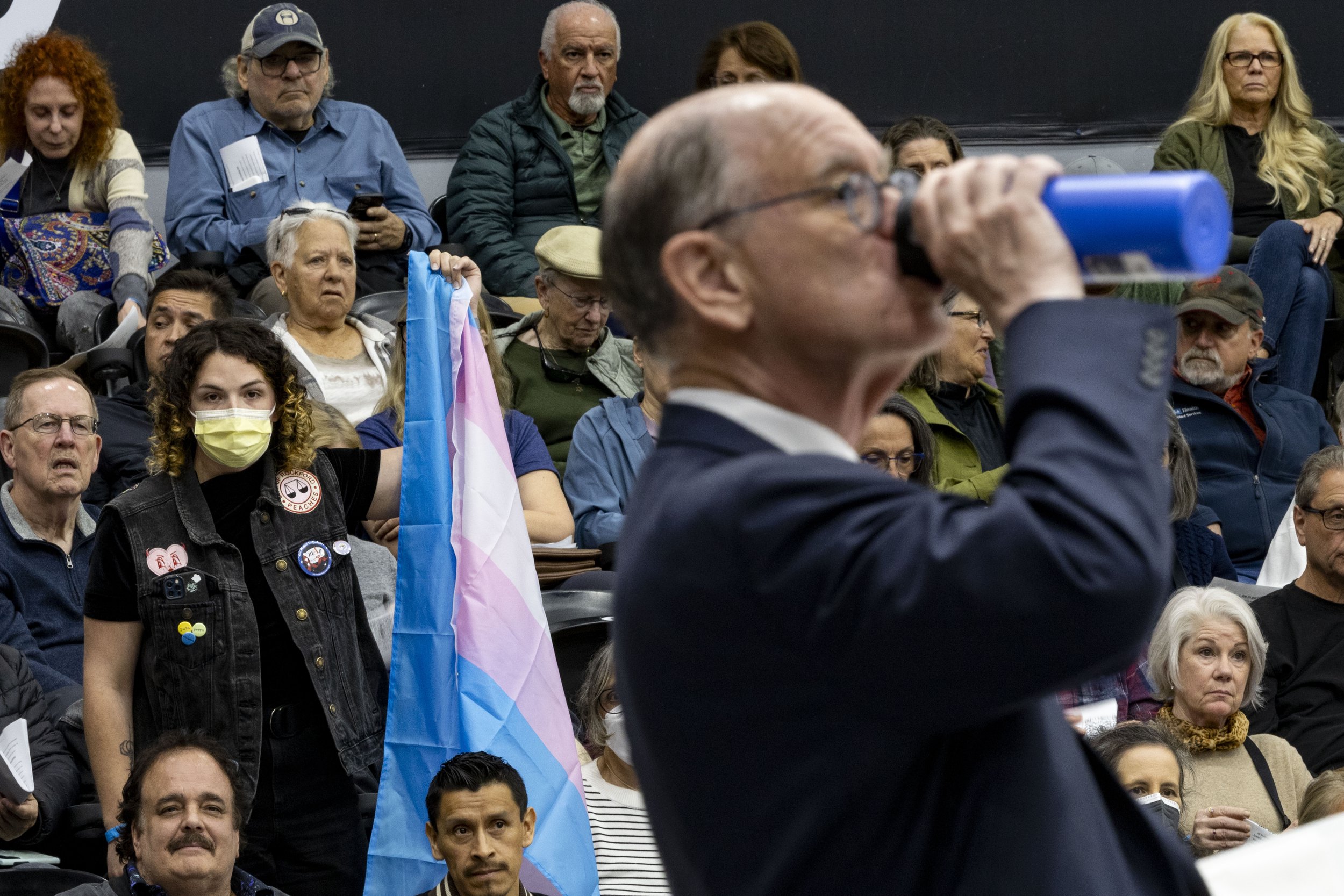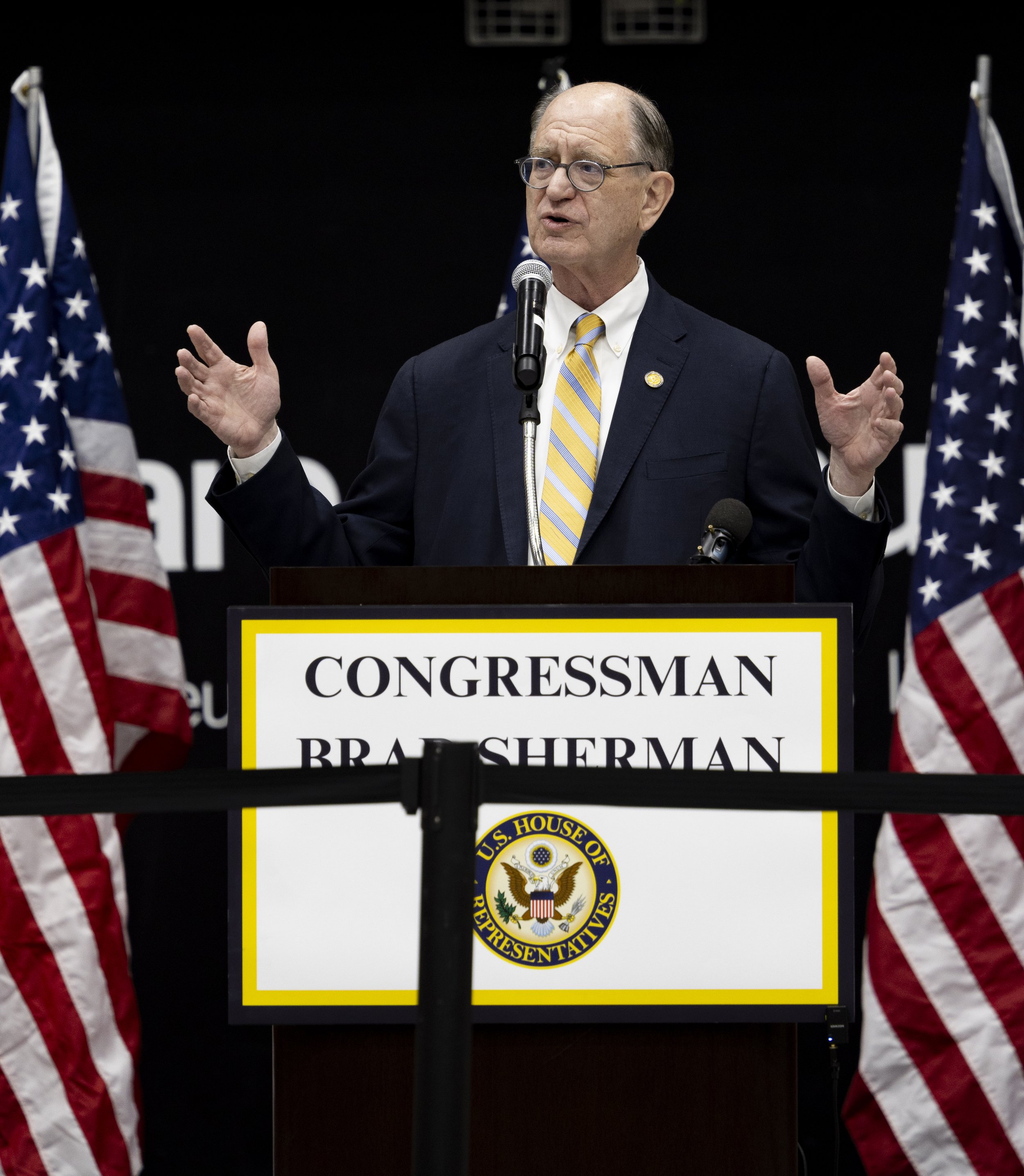Sherman is squirming, constituents close to fisticuffs












The gym was heated, welcoming impassioned constituents of Rep. Brad Sherman. As House representative of California’s 32nd Congressional district, Sherman represents about 760,602 Californians in Congress. About 1,800 of them hustled into the Premier America Credit Union Arena at California State University, Northridge (CSUN) on April 26 for a Town Hall event to hear from Sherman on his efforts to combat President Donald Trump’s “reckless and chaotic agenda.”
Randomly selected individuals waited on benches closer to the congressman, granted permission to look him in the eyes and question him directly. Sherman waxed and waned on the Department of Government Efficiency (DOGE), what he calls corruption in the federal government, protecting Social Security and the Department of Education, and the fears afflicting undocumented immigrants, generating raucous applause. He told jokes and bantered with his constituents. A banner behind him read, “CHAOS CAUSES CORRUPTION.”
Occasionally he engaged the audience with live polls on divisive issues. But the congressman maintained generally congenial camaraderie with the audience until about an hour in, when a voice broke clear through the silence.
“Say you support trans rights!”
The voice was Flora Gonska, transgender and pro-Palestine activist, who rose from the stadium bleachers and fixed themselves with a megaphone to ensure everybody clocked their deliverance.
“We have demands! You have trans constituents who need you to take a stand,” said Gonska. Sherman said he would only address those who had registered and gambled to speak. The crowd voiced their disagreement, cheering Gonska and shouting, “Answer her!”
“Say you support trans rights! Say it and I will sit down,” said Gonska. Though the congressman eventually spoke the words - “I do support trans rights” - the activist remained out of their seat and standing for the rest of the afternoon.
This rowdy public forum was rife with debate, dissent and even some one-on-one argumentation, impelling security to monitor the audience and dissuade fisticuffs. Per the request of CSUN, Sherman reduced the amount of ticket offerings after his office alleged receiving threats of violence from “various groups.” The group that showed up, nearing 2,000, was described in a press release by the Sherman team as “packed and passionate.” At its extreme, the release stated, it was a “charged atmosphere.”
The release did not elaborate that the “charged” personnel it referred to were frequently so moved to vocalize that they spoke out of turn, shouting from their seats and audibly overpowering the congressman. Though they broke the rules by making comments outside of the lottery system, their comments often drew the same amount of applause as Sherman’s.
The congressman joined the ranks of high-level government officials, Democrats and Republicans alike, who find themselves facing abundant criticism in fiery town halls across the country, a phenomenon that has considerably blossomed since Trump’s inauguration. At one such event on May 4, an audience for New York’s Rep. Mike Lawler “devolved into chaos,” according to The Hill, as screaming constituents were escorted out by law enforcement.
In March, a town hall by Republican Sen. Roger Marshall in Kansas was quickly shut down after a large faction of the audience began pressing the senator on federal actions by Trump and Elon Musk. Mike Johnson, Speaker of the House, subsequently warned Republican leaders to avoid town halls, and claimed that these events’ dissenters were mostly paid operatives.
Just two weeks prior to Sherman’s, 30th California district Rep. Laura Friedman met a swath of loudmouthed constituents, described as “hecklers” by the Daily Beast, at a town hall at Los Angeles City College. Though the events differed, many dissenters delivered similar concerns regarding their representative’s lack of “sufficient” action in response to the Trump administration.
At Sherman’s, in the climax of physical corrosion, a screaming match between a pro-Israel veteran and an Israel critic nearly came to blows in the grandstands before security cut in. Though the total group was a small fraction of his constituency, it was divided, with about one in 10 attendees in full approval of Trump and his agenda.
A significant round of “boo”s ensued when Sherman suggested he didn’t believe Nancy Pelosi had engaged in insider trading.
Above all, Sherman was open about his determination to counter Trump, and defined his strategy: “The way to stop Trump is to win the 2026 (House) election, and to educate and demonstrate and mitigate between now and that election.”
One audience member found this particularly unsatisfactory. “We did that eight years ago, and we’re back here again. What are you gonna do?” he yelled at Sherman, with arms spread wide. The audience roared in concurrence.
Following outbursts from several audience members, the crowd morphed into a free-for-all, peppering the congressman with forthright questions, even some accusations.
After her protest, Gonska departed the auditorium and joined leagues of pro-Palestine activists outside, who had gathered well over an hour before the Town Hall was scheduled to begin to protest the congressman’s support for Israel. Sherman is the co-chair of the House Israel Allies Caucus, and the most senior Democrat on the House-Knesset Parliamentary Friendship Group; the Knesset is Israel’s house of representatives.
At the demonstrations, protesters held signs reading “Stop Funding Genocide” and claimed Sherman is “owned” by the lobbying group American Israel Public Affairs Committee (AIPAC).
After leaving the Town Hall, one pro-Israel constituent yelled “Release the hostages!” before spitting on the protesters.
Sherman himself avoided speaking on Israel or any related issues at the Town Hall.
“Brad Sherman is the biggest Zionist in Congress,” said David Klein, retired professor of mathematics at CSUN.
An outspoken pro-Israel advocate, Sherman is known to defend Israel in Congress, promote the #BringThemHome movement and sponsor legislation such as the current “Accountability for Terrorist Perpetrators of October 7th Act.”
Though Gonska differs with the politician on foreign affairs, their mid-rally fight didn’t mean they disagreed on everything. “Brad Sherman is (actually) one of those Democrats who supports queer rights, at least on paper,” Gonska said afterwards. “My big issue is that he has not made any public statements since before the election last year.”
Though Gonska described the congressman’s reaction to their outcries as “mid,” the evident success was in constituent backing. “There was a lot of positive reception from people who knew what was going on,” they said. “There was a lot of people who, during and after, came over and said like, thank you for doing that. Thank you for saying it. Somebody needed to say it.”
Having achieved solidarity, Gonska described the room as a typical American forum: “It’s not that the people don’t support trans rights or the people don’t support trans people. It’s that the politicians are often unwilling to bridge that gap of, like, actually representing their constituents.”
